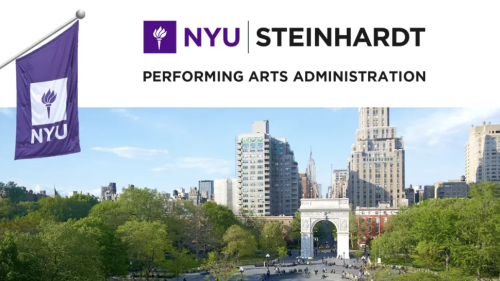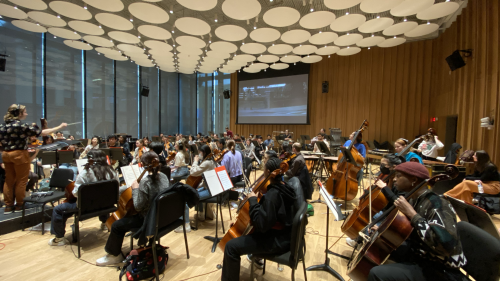
On Friday, February 24, the NYU Performing Arts Administration Graduate Program hosted a panel event focused on introducing potential internship opportunities across several artistic disciplines. The first half of the conversation featured internship supervisors from American Ballet Theatre and AMS Planning & Research who shared application tips, work expectations, and ways of maximizing the internship experiences. Students heard directly from internship directors and learned about opportunities in the commercial and nonprofit arts sectors, and arts consulting organizations.
Panelists who are currently interning, or have recently completed an internship, shared an in-depth overview of the internship process from researching opportunities and preparing applications to networking beyond the internship experience. In addition, they shared what it is like to work for major cultural organizations in New York City and beyond.
Panelists
Maimouna Camara (‘23)
Finance & Operations Fellow, New York Theatre Workshop
Chisato Fuji (‘23)
Donor Relations Assistant Intern, Aspen Music Festival and School, Corporate Partnerships Intern, Japan Society
Albert Martinez (‘23)
Diversity, Equity and Inclusion Intern & Laffont Competition Intern, The Metropolitan Opera
Naomi Gewanter,
Director of Operations, Education & Training at American Ballet Theatre
Brian Harasek,
Director of Group Sales, Broadway Direct
Brian was unable to join due to unforeseen circumstances, but he invited students to contact him directly.
Lynette Turner,
Senior Associate, AMS Planning and Research
Tell us about your internship search process. When did you start the search? How much time did you spend researching internship opportunities?
“I started searching for an internship position during winter break, and I made a list of organizations that I wanted to apply to. From January to March, as I was going through the application process, I revised my resume, cover letter, and practiced for interviews using the Wasserman Center and did mock interviews with my friends. In the application process, I also did self analysis, because the employer needs to know who I am in such a short amount of time. So to be able to speak about myself, I thought I first need to know about myself better.”
- Chisato Fuji (‘23), Donor Relations Assistant Intern, Aspen Music Festival and School Corporate Partnerships Intern, Japan Society Arts
How did you prepare for your interview?
“The most important part of preparing for an interview is to do your research -- by research I mean all available data you can find online, but also asking other people. Most importantly, what employers want to see is how the internship experience is going to impact your career, and how working at the organization is going to be a stepping stone in your journey”
- Albert Martinez (‘23), Diversity, Equity and Inclusion Intern & Laffont Competition Intern, The Metropolitan Opera
What makes a candidate’s application (resume and cover letter) and interview stand out?
“The first thing that makes it stand out is clarity about why do you want this fellowship. Sometimes people haven’t had a full-time job yet, but talking with clarity and passion about what you have done in the past [is important]… We think it’s important to be able to ask questions in the interview process. We also think it’s important for the applicant to tell us what you wish to learn.”
- Lynette Turner, Senior Associate, AMS Planning and Research.
Did you gain a new perspective on your career choice from your internship or how to balance career and life?
I’ve always wanted to produce for a long time. I was producing before I joined NYU and it’s just reinforcing what I want to do and who I want to do it for. I never worked in the off-broadway space before and it prepares me to be the producer I want to be, and to be a change maker, who has a plan to respond to the world around us. I feel versatile and fluid when I use a lot of the skills I’m learning at the workshop. I hope my fellowship continues to strengthen my professional development skills.”
- Maimouna Camara (‘23), Finance & Operations Fellow, New York Theatre Workshop
Do you consider applicants with little or no experience in the field?
“It’s great if we see previous experience but, I wouldn’t say we expect it for all of our positions. Especially if you’re in a program like this, highlighting the relevant courses you’re taking on your resume is a great way to let people know what you’re interested in, and that you are working toward a career in this field, even if you don’t necessarily have previous experience. We are looking to bring people in and teach them how to contribute to the organization. This is more about developing a talent pipeline.”
- Naomi Gewanter, Director of Operations, Education & Training at American Ballet Theatre
Do you have any final advice for those currently considering an internship?
“Follow your dream and your vision. Say what you need and what you want and be open to the feedback that many people will be willing to give you to help you get there.” - Lynette Turner, Senior Associate, AMS Planning and Research.
In photo from top left: From top left to right: Maimouna Camara, Chisato Fuji, Albert Martinez, Naomi Gewanter, Brian Harasek, and Lynette Turner


